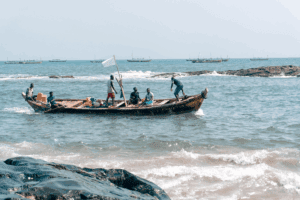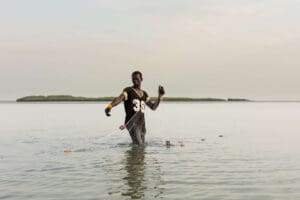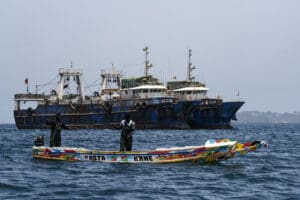No ocean justice without coastal communities
Coastal communities around the world are sounding the alarm – their territorial waters are under threat, and their voices are being ignored. From Asia to Africa, small-scale fishers are losing access to resources within the waters they have depended on for generations. Industrial trawlers sweep through nearshore zones, leaving devastation in their wake, and the people most impacted are rarely invited into the rooms where decisions are made that directly impact their futures.
As Blue Ventures heads to the 2025 UN Ocean Conference (UNOC3) along with a delegation of small-scale fishers from across the coastal tropics, we are urging world leaders to centre the rights and voices of these fishers and their coastal communities in decision-making. These representatives will be calling for governments to uphold their commitments to small-scale fisheries, as laid out in the Small-Scale Fisheries Call to Action. The stakes couldn’t be higher. This is a pivotal opportunity to reimagine ocean governance – one that either delivers justice for communities on the frontlines or continues to uphold a system that is failing them.
In West Africa, communities are being pushed out of their fishing grounds by industrial fleets that operate with impunity. “Fishers are going out further, staying longer, and spending more – just to bring back less,” says Aissata Dia, Blue Ventures’ Head of Advocacy for West and Central Africa. “People are abandoning fishing because they can no longer make a living, and some are taking dangerous migration routes. This is not just an economic issue; it’s a social crisis, and it’s unfolding right now.”
This struggle is echoed across tropical coastlines, where small-scale fisheries support millions of livelihoods and provide a vital source of nutrition. In Indonesia, coastal communities are feeling the pressure of large-scale industrial operations that threaten their access to the ocean. This imbalance of power is a global issue – one that demands a shift in how decisions about the ocean are made.
“UNOC is a critical opportunity to make big changes,” says Zélie Pelletier, Campaigns Manager for the Transform Bottom Trawling Coalition. “We need to stop seeing ocean governance as something that happens to coastal communities, and start recognising them as the leaders of ocean protection and restoration. It’s not enough to listen to them – they need real power, real resources, and the right to shape the future of their fisheries.”
But the current system isn’t built to support small-scale fishers. Despite clear evidence that community-led conservation works, global commitments still fall short. Ocean governance continues to favour extractive industries over the people who rely on healthy marine ecosystems for their survival, while the expansion of bottom trawling and other destructive practices undermines the food security and economies of entire nations.
“Small-scale fishers are the bedrock of ocean-based economies,” says Elsa Pullman, European Campaigns Advisor for Blue Ventures. “But policies continue to prioritise short-term profits for industrial fleets over the long-term wellbeing of coastal communities and marine ecosystems. This cycle must be broken, or we risk losing the very resources that these communities rely on for survival.”
In Europe, more than a quarter of a million people have called on the EU to end bottom trawling in marine protected areas. This groundswell of public support shows the urgent need for a just transition away from destructive industrial fishing. At the same time, the EU must back the fishers already leading the way. That means standing with low-impact, small-scale fisheries and delivering on promises like Article 17 of the Common Fisheries Policy, which calls for fair access to fishing opportunities for those who fish more sustainably.
Governments around the world are pledging to protect biodiversity and ensure sustainable fisheries, but these promises will never be realised without the knowledge and leadership of small-scale fishers.
“In many places where we work, fishers are already managing their own marine resources, using traditional knowledge and practices to protect their environment,” says Annie Tourette, Blue Ventures’ Director of Advocacy. “They have solutions that work and that benefit both people and nature. We need to shift power so that their efforts are recognised and supported, not sidelined or replicated without them.”
Blue Ventures has seen firsthand the power of community-led conservation. “What’s happening at the local level is inspiring,” says Aissata. “Communities are coming together, mobilising, and demanding a seat at the table. And when they are given the opportunity, they are showing us that they can restore their waters and livelihoods. But they can’t do it alone, not when the system is still built to favour others.”
Delivering on that shift means securing preferential access and co-management of coastal areas, recognising traditional knowledge, and ending subsidies that prop up destructive industrial fleets. It also means fundamentally rethinking how global ocean governance is shaped – and who gets to shape it. Small-scale fishers already hold the knowledge and leadership needed for change. What’s missing is the political will to centre them in the decisions that affect their futures.
As part of our commitment to putting small-scale fishers at the heart of ocean conservation, Blue Ventures is supporting fisher leaders from Indonesia, Ghana, and Europe to attend UNOC3, not just to participate, but to lead. Their presence is a powerful reminder of the solutions hidden in plain sight, rooted in traditional knowledge, lived experience, and community-driven action. It is time for decision makers to listen, act, and be held accountable.
UNOC3 must move beyond rhetoric. “Recognising and protecting small-scale fishers’ rights is not just a matter of social justice,” says Annie. “It’s a powerful and proven strategy for achieving lasting ocean conservation. If world leaders are serious about protecting the ocean, they need to start by backing the people who depend on it most.”
All insights contributed by Aissata Dia, Annie Tourette, Elsa Pullman, and Zélie Pelletier — part of Blue Ventures’ Global Advocacy team


















